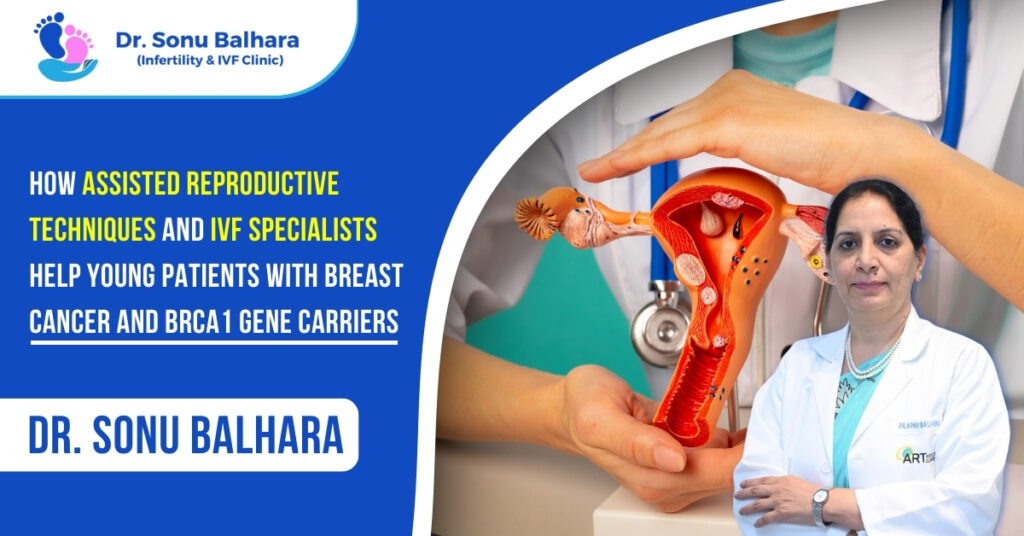For young patients diagnosed with breast cancer or those who carry the BRCA1 gene mutation, the journey of building a family can give them a feeling of uncertainty. The dual challenges of managing health risks and planning for a family often leave individuals overwhelmed. Fortunately, advancements in assisted reproductive techniques (ART) have opened new pathways, providing hope and empowering these individuals to take control of their reproductive health.
Understanding the BRCA1 Gene and Breast Cancer Risks
The BRCA1 gene mutation is associated with significantly higher risks of breast and ovarian cancer. Women who carry this mutation have a 65% lifetime risk of developing breast cancer and an increased risk of ovarian cancer. For men, the mutation also increases risks of prostate cancer and other malignancies. What makes the situation more complex is the hereditary nature of BRCA1, meaning there’s a 50% chance of passing it on to the next generation.
For young women with breast cancer, treatment options such as chemotherapy and radiation can compromise fertility. Similarly, BRCA1 carriers who opt for preventive measures like risk-reducing salpingo-oophorectomy (removal of ovaries and fallopian tubes) face challenges in preserving their ability to have biological children.
This is where ART and reproductive medicine specialists/ IVF specialists step in as a game changer.
Fertility Preservation Options Before Cancer Treatment
For young patients diagnosed with breast cancer, the window of time before starting treatment is crucial. Fertility preservation techniques can help ensure the possibility of having biological children in the future. Some of the key options include:
- Egg Freezing (Oocyte Cryopreservation):
Before starting cancer treatment, women can undergo controlled ovarian stimulation to retrieve mature eggs, which are then frozen for future use. This method is ideal for those who do not currently have a partner or prefer to delay family planning. - Embryo Freezing:
For patients with a partner or those who wish to use donor sperm, retrieved eggs can be fertilized to create embryos, which are then frozen for future implantation. Embryo freezing offers higher success rates compared to egg freezing alone. - Ovarian Tissue Freezing:
In cases where cancer treatment must begin immediately and there isn’t enough time for egg or embryo freezing, ovarian tissue can be surgically removed and frozen. This tissue can potentially be re-implanted after recovery to restore fertility.
Genetic Testing and Family Planning for BRCA1 Carriers
For BRCA1 carriers, ART provides an opportunity to ensure their children do not inherit the mutation. Through Preimplantation Genetic Testing for Monogenic Disorders (PGT-M), embryos created via IVF can be screened for the BRCA1 mutation. Only embryos free of the mutation are implanted, giving parents peace of mind about their child’s genetic health.
Steps Involved in IVF with PGT-M:
- Ovarian Stimulation and Egg Retrieval: Hormonal treatments stimulate the ovaries to produce multiple eggs, which are then retrieved.
- Fertilization: The eggs are fertilized with sperm to create embryos in the embryology lab.
- Genetic Testing: A few cells from each embryo are biopsied and tested for the BRCA1 mutation.
- Embryo Selection and Transfer: Only embryos free of the BRCA1 mutation are selected for transfer to the uterus.
This process not only helps prevent the transmission of BRCA1 but also ensures that carriers have a safe pathway to parenthood.
Emotional and Psychological Support
For young cancer patients and BRCA1 carriers, the journey can be emotionally taxing. The decision to undergo ART often involves grappling with medical, ethical, and financial considerations. It’s crucial to have access to counseling services that address these emotional and psychological aspects. Support groups, mental health professionals, and fertility specialists can provide guidance and reassurance throughout the entire process.
The Role of Multidisciplinary Care
The integration of oncology, genetics, and reproductive medicine is vital in managing the unique needs of young cancer patients and BRCA1 carriers. A multidisciplinary team can help patients navigate decisions about fertility preservation, cancer treatment, and family planning. Collaboration between oncologists, reproductive endocrinologists, and genetic counsellors ensures a holistic approach to care.
The Hope ART Provides
Assisted reproductive techniques have transformed the outlook for young cancer patients and BRCA1 carriers. These advancements enable individuals to prioritize their health while still keeping their dream of parenthood alive. By taking proactive steps whether through egg freezing, IVF with PGT-M, or other fertility preservation methods, patients can embrace the future with confidence.
For those facing the dual challenges of cancer or genetic risk and family planning, ART offers not just solutions but hope, empowerment, and the chance to create a family on their own terms.

